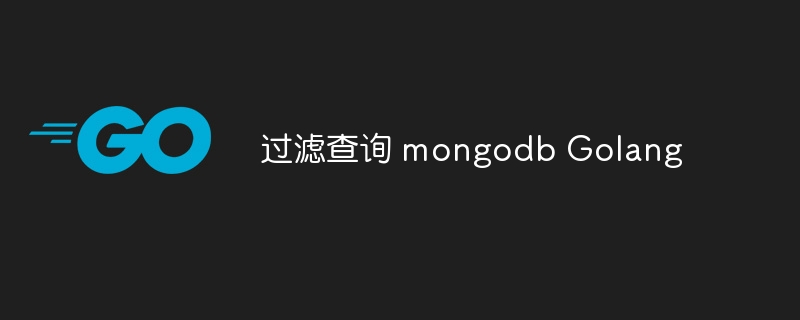

php editor Xigua today will introduce to you the Golang implementation of filtering query mongodb. When using mongodb database for data query, we often need to filter the query results to meet specific conditions. As a powerful programming language, Golang provides a rich mongodb driver library, which can easily implement filtering query functions. Next, we will introduce in detail how to use mongodb to filter queries in Golang to help everyone better apply and understand this function.
I'm trying to get a list of data that matches a specific query but I'm getting this error
"(atlaserror) merchant is not allowed or the syntax is incorrect, see the atlas documentation for more information"
func ...
var result []*model.Package
ctx, cancel := context.WithTimeout(ctx, 10*time.Second)
defer cancel()
tokenData, err := middleware.CtxValue(ctx)
if err != nil {
return nil, err
}
orQuery := []bson.M{}
merchant := "abc"
completedQuery := bson.M{"status": "completed"}
cancelledQuery := bson.M{"status": "cancelled"}
orQuery = append(
orQuery,
cancelledQuery,
completedQuery)
limit64 := int64(limit)
page64 := int64(page)
match := bson.M{"$match": bson.M{"$nor": orQuery}}
var filterQuery primitive.M
if tokenData.Role == "admin" && merchant != nil {
filterQuery = bson.M{"merchant": bson.M{"id": merchant}}
} else {
filterQuery = bson.M{"user": bson.M{"id": tokenData.Id}}
}
paginatedData, err1 := paginate.New(r.Collection).Context(ctx).Limit(limit64).Page(page64).Aggregate(match, filterQuery)
if err1 != nil {
return nil, err1
}
...filterquery, seems to contain { "merchant" : { "id" : "abc" } }, which is passed alone Give .aggregate(). But the aggregation framework expects to receive something that represents a series of pipeline stages. Each phase is outlined in the documentation and is expected to start with $ characters, e.g. $match phase.
The current database is trying to handle merchant as the options of the pipeline (see here and here). But such option does not exist, hence the error message.
To fix this, you should merge the filterquery logic into the existing match variables/stages you are building and passing. Alternatively, you can wrap filterquery in different $match and pass them (as a single argument) to .aggregate().
This example shows them building multiple stages and then submitting them together via mongo.pipeline{...}:
.aggregate()
// create the stages
matchStage := bson.D{{"$match", bson.D{{"toppings", "milk foam"}}}}
unsetStage := bson.D{{"$unset", bson.A{"_id", "category"}}}
sortStage := bson.D{{"$sort", bson.D{
{"price", 1},
{"toppings", 1}},
}}
limitStage := bson.D{{"$limit", 2}}
// pass the stage into a pipeline
// pass the pipeline as the second paramter in the Aggregate() method
cursor, err := coll.Aggregate(context.TODO(), mongo.Pipeline{matchStage, unsetStage, sortStage, limitStage})The above is the detailed content of Filter query mongodb Golang. For more information, please follow other related articles on the PHP Chinese website!




